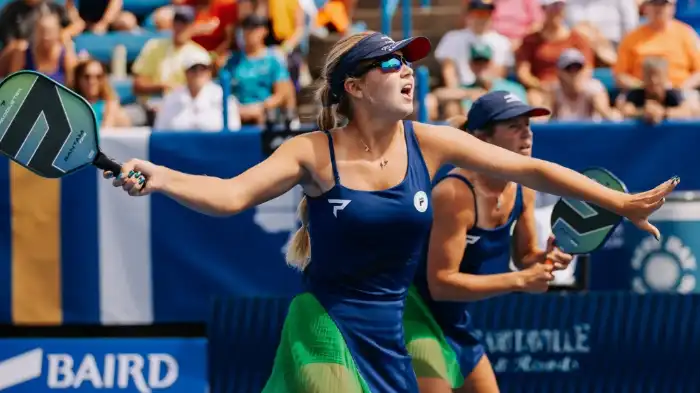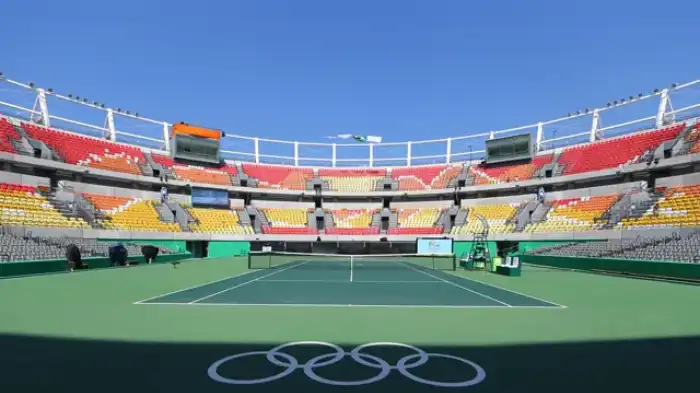In the realm of sports, few have seen such rapid growth and enthusiastic adoption as Pickleball. A sport that’s taken the world by storm, Pickleball has enthusiasts of all ages, from novices to seasoned athletes, taking to the courts with fervor. With this meteoric rise in popularity, a pertinent question has emerged: Is Pickleball a Olympic Sport? In this blog, we are going to discuss the debate on whether pickleball is an Olympic sport or not, along with some information on the origin and growth of this sport.
Origin and Growth of Pickleball
Pickleball was invented by Joel Pritchard, Bill Bell, and Barney McCallum in 1965 in the state of Washington, USA. The friends were looking for a game that could be played by the entire family and stumbled upon a combination of various sports, which eventually became known as pickleball. With a unique blend of strategy, skill, and a reduced court size, the sport quickly gained popularity among people of all ages and fitness levels.
In recent years, pickleball has experienced an unprecedented surge in popularity. The number of dedicated pickleball courts has increased, and many tennis and recreational facilities have started incorporating lines for pickleball on existing courts. The sport is now played in over 90 countries and has attracted a diverse player base, including both recreational players and competitive athletes.
The Debate: Is Pickleball a Olympic Sport?
While pickleball’s popularity continues to rise, the prospect of it becoming an Olympic sport is still uncertain. Various factors come into play when considering a sport’s inclusion in the Olympic program, such as the number of countries participating, gender equality, and the sport’s overall global reach and development.

International Federation Recognition
For a sport to become an Olympic event, it must be recognized by an international federation that governs it. In the case of pickleball, the International Federation of Pickleball (IFP) holds this responsibility. However, the IFP is relatively new and still in the process of increasing its presence and establishing partnerships with national governing bodies worldwide.
The IFP’s efforts have been commendable, but more work needs to be done to gain recognition from the International Olympic Committee (IOC). Once recognized, pickleball can move forward in its quest for Olympic status.
Support From the National Olympic Committees
An essential aspect in the journey towards becoming an Olympic sport is the support from National Olympic Committees (NOCs). These committees represent each country’s interests in the Olympic Movement and play a crucial role in advocating for new sports to be included in the Games.
Pickleball has been making significant strides in gaining support from NOCs in countries where it is most popular, such as the United States. The formation of national governing bodies in various nations demonstrates the commitment to developing the sport at a national level. This progress bodes well for pickleball’s future Olympic aspirations.
Frequently Asked Questions
The chances of pickleball becoming an Olympic sport are uncertain. While the sport has rapidly grown in popularity worldwide, it still faces some obstacles on its path to the Olympics. The International Olympic Committee (IOC) has strict criteria for including new sports, such as requiring a certain number of participating countries and adhering to certain standards. However, pickleball enthusiasts and governing bodies are actively pushing for its inclusion and remain hopeful for its Olympic future.
Yes, there are a few challenges and criticisms surrounding pickleball’s Olympic bid. Some critics argue that pickleball lacks the tradition and long-standing history associated with Olympic sports, which may make it harder for the IOC to consider its inclusion. Additionally, there may be concerns about the level of competition and the need to establish consistent rules and regulations across different countries. However, these challenges can be addressed over time as pickleball continues to grow and develop.
Fans and players can play a crucial role in supporting pickleball’s Olympic aspirations. Firstly, they can actively promote the sport by participating in tournaments, organizing local events, and introducing pickleball to new players. Building a strong and active community is integral to gaining recognition and support for Olympic inclusion. Additionally, players can advocate for pickleball with their respective national governing bodies, encouraging them to push for its recognition at the international level. Finally, fans can voice their support through social media, spreading the word about pickleball’s potential as an Olympic sport.
Yes, gender equality is a significant consideration. Pickleball, as with all potential Olympic sports, strives to ensure equal opportunities for male and female athletes in terms of competition, representation, and participation.
Conclusion
Pickleball’s remarkable journey, from its creation in 1965 on Bainbridge Island, Washington, to its current meteoric rise in popularity, is nothing short of inspiring. As enthusiasts of all ages embrace the sport with enthusiasm, the question of whether Pickleball will attain Olympic status has come to the forefront.
While Pickleball isn’t an Olympic sport at present, its growing international recognition through the International Federation of Pickleball (IFP) and the increasing support from National Olympic Committees (NOCs) paint a promising picture. The sport’s inclusivity, accessibility, and the dedication of its global community position it as a strong contender for future Olympic recognition.
As we follow Pickleball’s exciting journey toward potential Olympic inclusion, enthusiasts worldwide eagerly anticipate the moment when the sport’s distinct “pop” might echo on the world’s grandest sporting stage. Until then, the question “Is Pickleball a Olympic sport?” remains open, inviting optimism and anticipation.

